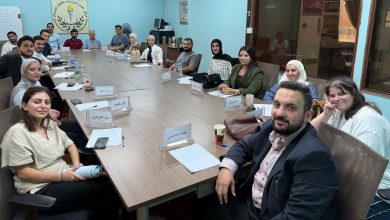Final Statement and Recommendations for The Fifth Scientific Conference on Academic Freedom in Arab Universities Held during the period 21-22/12/2013
Introduction:
The Fifth Scientific Conference of Freedom Academy in Arab Universities held on 21st and 22nd December, 2013 in Amman, Jordan, organized by Amman Center for Human Rights Studies (ACHRS), in cooperation with the Foundation for the Future (FFF), and thankfully sponsored by the President of the University of Jordan. The conference was attended by sixty (60) distinctive personalities of professors made up of professors, researchers, and experts working in 31 Arab and foreign universities from sixteen (16) countries.
The participants confirmed in the conference the importance of identifying a measurement of academic freedoms in Arab universities which would contribute in
i. raising the standard of higher education in the Arab word,
ii. promoting the relationship between academia and the community, and
iii. fostering a positive relationship between government and the universities in the Arab world.
Participants appreciated the efforts exerted by ACHRS and the FFF in developing the measurement of Amman Center for academic freedom in Arab universities. Further, they expressed the vital need for awareness raising activities to be organized to promote the concept of academic freedom in general and in particular, as embodied in the Amman Declaration for Academy Freedoms in 2004. This effort, should be sustained and expanded, beyond the confines of the academic community, to the society as a whole and its various institutions, including national Parliaments to work on constitutionalizing or legalizing those rights, as is the case in some democratic States.
In light of the discussion of eleven (11) research papers presented at the conference, the participants reached the following conclusions and recommendations, that:
- The conference approved the first compilation of the Amman Center Measurement for Academic Freedoms in Arab Universities and encourage efforts to initiate applying it through the indicators (and sub-indicators) approved by the participants
- The conference organizers and the Arab Society for Academic Freedoms should compile and launch yearly reports based these indicators.
- Governments and owners of private universities should recognize the academic freedoms as enshrined in their constitutions of their various countries as well as in the international laws to which the country is a State Party without imposing any restrictions or conditions, and to promote the principle of academic freedom within the limits required by scientific research.
- Governments should also amend the constitutions of their States, where necessary, to enable the State’s academic freedom standards to meet that state’s international legal commitments. Where the State is not Party to any of the major international human rights treaties which protect academic freedom, the State shall take urgent steps to ratify and domesticate such treaties.
- Universities in the Arab world should determine transparent academic and moral standards of scientific promotion, determine justice in admission policies for students, and ensure equal opportunities for admission to universities and higher educational institutions.
- Arab Universities should promote the principles of academic governance and initiate measures to minimize towards eradicating all aspects of corruption embedded in the academic field.
- Arab Universities should promote the establishment of trade union bodies for university staff and activate the existing ones to contribute to ensuring their job security and improve their scientific, social, and physical situations.
- Arab Universities should resist interference by the executive authorities in policies related to curricula development and the appointment of faculty members, and the need to adopt national committees elected by the university staff to handled the hiring or assigning of teachers and issues relating to promotion, in order to ensure the embodiment of the values of efficiency, integrity, and transparency, whether it is related to the hiring of teachers or admission students.
- University management should work on protecting members of the academic community from the social and ideological pressures and restrictions, and change the cultural structures of stereotypes about a number of topics that are prohibited in the context of academic work, such as religion, politics, and sex.
- Arab Universities should work on respecting the principle of equality and balance of gender within the academic institutions and their representative bodies, particularly the trade unions.
- Arab Universities should concentrate on the importance of promoting scientific rigor in the academic structure, such as for academic ranking, based on scientific excellence as the norm, not on politics, religion, sectarianism, or regionalism.
- Arab Universities should focus on the freedom of the faculty member and the freedom of the university to provide special curriculum materials or teaching plans at the level of universities to promote the speedy development of Arab universities in the world through e-learning and scientific advancement in all fields, without the intervention of the Ministry of Higher Education on the pattern of disciplines in the universities.
- Arab Universities should pay attention to the democracy of learning between faculty and students. Students should be able to express their opinion. Even contrary to the scientific position of a faculty member.
- Arab Universities should lay emphasis on the concept of social responsibility to ensure effective communication between the academic and social elements in order to raise the level of knowledge of the community.
- Governments should ensure and promote the financial autonomy of universities and allow for the multiplicity of financial resources for academic institutions. Government should see its financial support as a fulfillment of its duty to universities, not a favor.
- Government should apply the laws regulating the setting up and running of universities on an even keel to private universities as well, and the teaching staff of private universities should not submit to labor laws alone.
- Amman Center for Human Rights Studies, in collaboration with like-minded bodies should hold a yearly conference for the Arab Society of Academic Freedom to discuss the scientific reports about the achievements of the recommendations mentioned above.
Amman, December 22nd, 2013.




